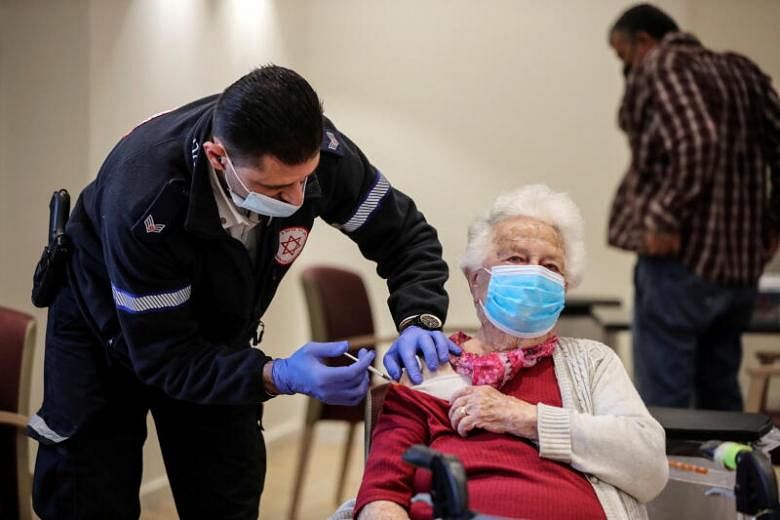SINGAPORE - One of the best moves by Israel in the coronavirus pandemic was acting rapidly even before all the data had emerged, said its Ambassador to Singapore, Mr Sagi Karni.
And yet, much of its effort has been undermined by anti-vaxxers and by people not complying with safety measures. Its safest citizens are those who have taken booster vaccine shots, said an Israeli medical expert.
On its part, the Israeli government had left no stone unturned.
Mr Karni highlighted how it closed its borders in March 2020, before the World Health Organisation declared the pandemic, and again for four weeks when the new Omicron variant emerged, to slow down the entry of the virus.
Israel was also at the forefront of vaccine efforts, starting a mass mRNA vaccination campaign in December 2020. It was the first country to give booster shots last year.
In January this year, it started giving seniors and at-risk people (younger people with underlying medical conditions, for example) a second booster shot.
This has reduced the number of deaths but Israel would have fared even better if so many had not opted to stay unvaccinated.
Relative to Singapore, its casualties are high. More than 8,700 people out of Israel's 9.3 million population have died from Covid-19 - or 936 deaths per million population. In Singapore, where the disease has killed 854 people, the rate is 144 per million population.
The worst casualty rate is in Peru, where more than 6,000 people per million have died. The United States, Belgium, Italy, Britain and Russia have all suffered more than 2,000 Covid-19 deaths per million population.
Ambassador Karni pointed to the unvaccinated, who account for about a third of Israel's population, noting: "Of people in intensive care, the vast majority are unvaccinated or have medical problems."
About 64 per cent of the population has been fully vaccinated, with 4.4 million people, or nearly half the population, with at least three mRNA shots. This is far lower than the 88 per cent of Singapore's population who are fully vaccinated, and 56 per cent with booster shots.
Mr Karni said the anti-vaxxer group is very vocal in Israel: "There was a demonstration in Tel Aviv in summer last year accusing the government of experimenting with human lives. They were using megaphones and giving out brochures."
Although almost a third of Israelis are not vaccinated, Mr Karni said Israel "is not timid" and has opened up its borders to vaccinated travellers who test on arrival, and has reduced the quarantine period from 10 to seven days.
"Too many people in quarantine will hurt the economy," he said.
Dr Boaz Lev, who heads the advisory panel to Israel's Ministry of Health, told The Straits Times in a video call that booster shots have cut the number of severe illness and deaths in Israel.
He said protection from having just two shots of the mRNA vaccine "is tremendously low. Hospital rates are much higher than for those who have had three or four shots".
"Those who are severely ill are mostly those who have not been vaccinated or vaccinated not more than two times," he added.
Those who received their second jab at least 28 weeks back are considered "vaccinated without validity" in Israel.
The second booster shot, given to people 60 years and older, and to those 18 years and older with underlying medical conditions, pushes up protection by three to five times, he said.
But he added: "I've had four shots of mRNA but I still got Omicron... Luckily it was mild."
On whether protection from the booster shot would start to wane after about four months, like with the earlier shots, he said: "Ask me that in five months."
Some experts worry that giving vaccines too frequently could result in a lower immune response.
Dr Lev said: "Sometimes our answers have to be short term. We have a strong Omicron wave on our hands and the benefits outweigh the risks. We assess the side effects to be comparable to the first three shots. Omicron moved so fast, people deserve the extra protection."
Getting a second booster shot more than triples their protection against infection.
He said the Omicron wave is peaking in Israel and that he expects numbers to go down within the month.
Infections hit a high of more than 83,000 on Jan 23 and are now hovering around 60,000 new cases a day.
Although Omicron is six times less severe than the Delta variant in causing illness, Dr Lev said severe illness and deaths always lag behind infection.
But there is some concern that "maybe, once the Omicron wave declines, there might be another surge of Delta" which causes more severe illness, said Dr Lev. About 91 per cent of infections in Israel today are caused by Omicron.
Mr Karni praised Singapore for doing extremely well in keeping deaths low, attributing it to the country having one of the highest vaccination rates in the world, as well as a supportive population.
"Nobody is happy to wear masks in this hot weather, but people do it," he said. Compliance in Israel is not as good.
Dr Lev agreed: "Distancing is important but difficult to maintain in Israel. Wearing of masks is not enforced in a strict manner. Israelis are not very obedient."













